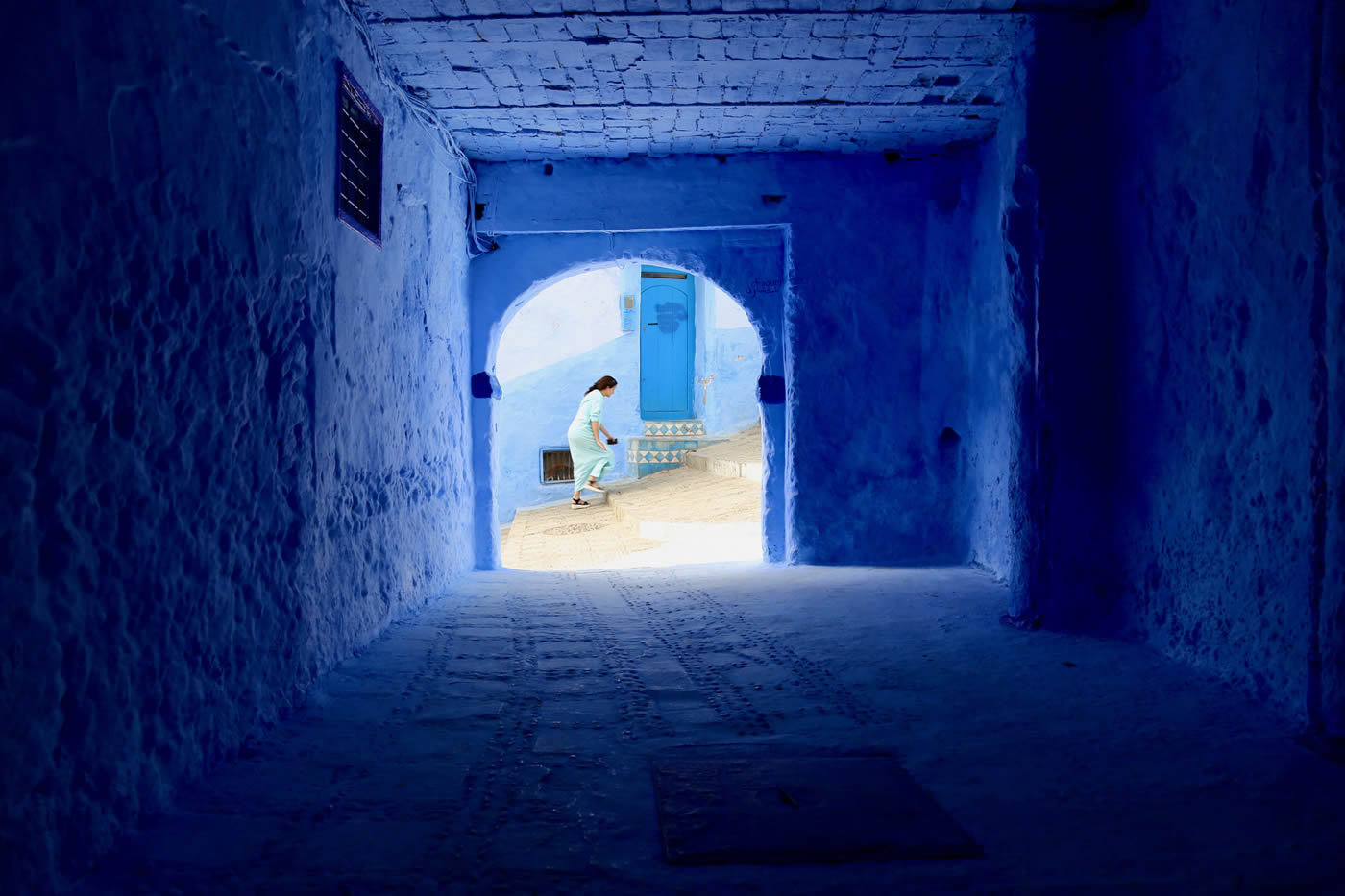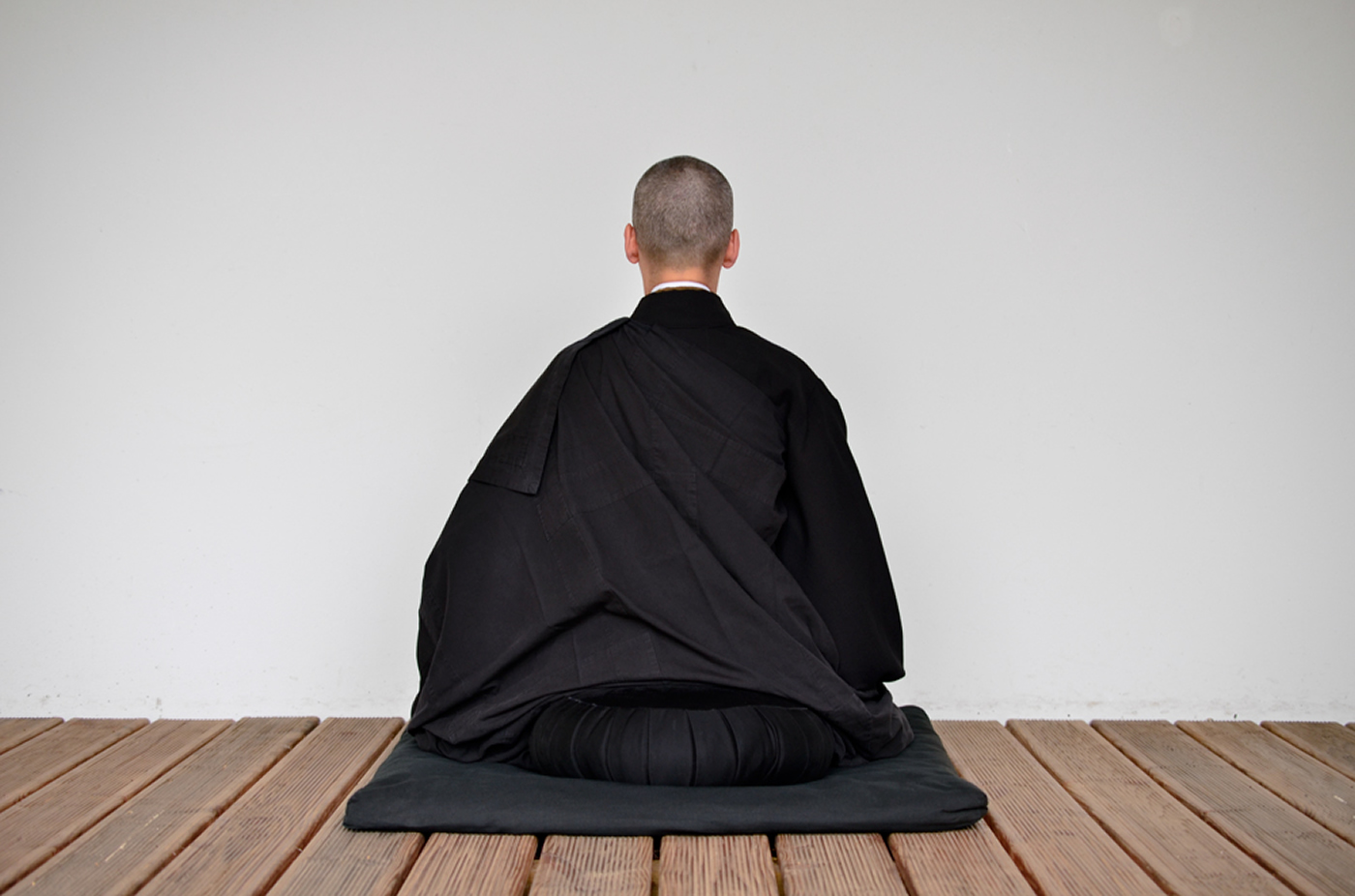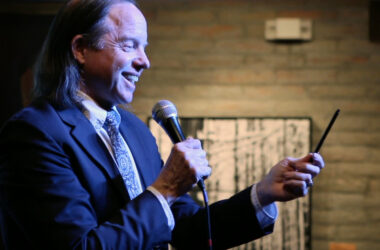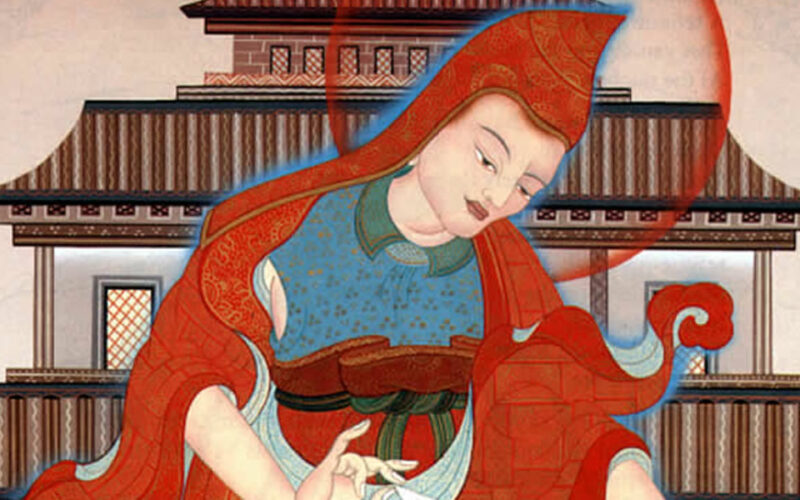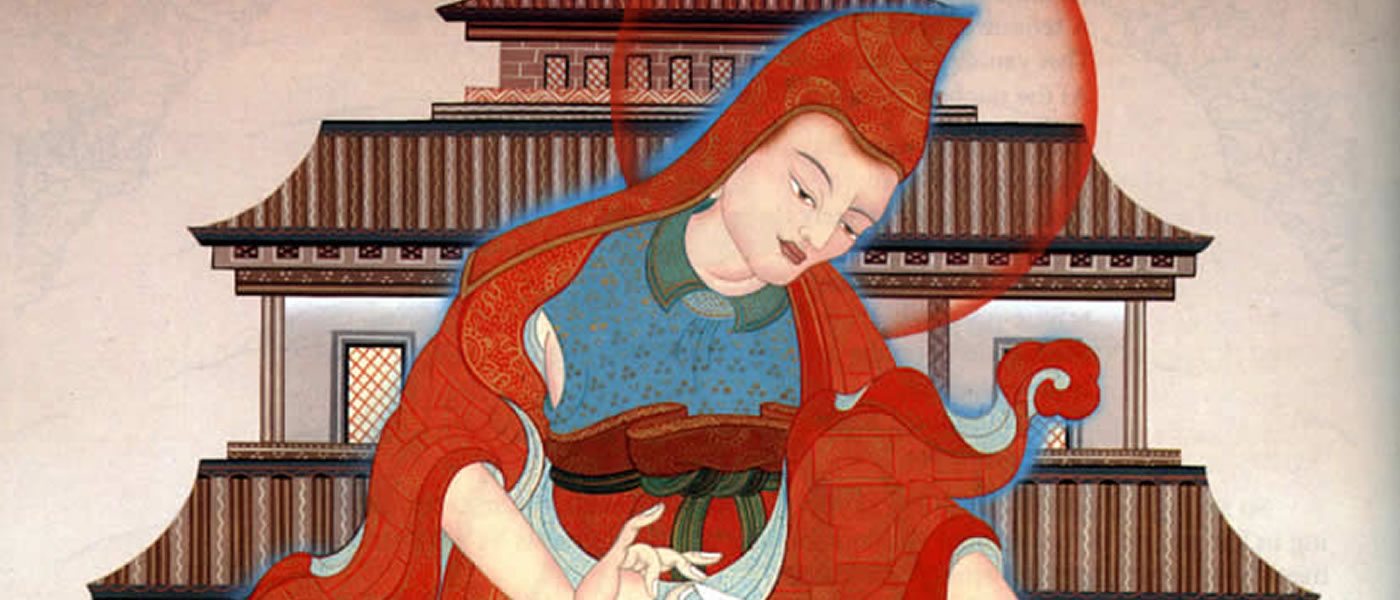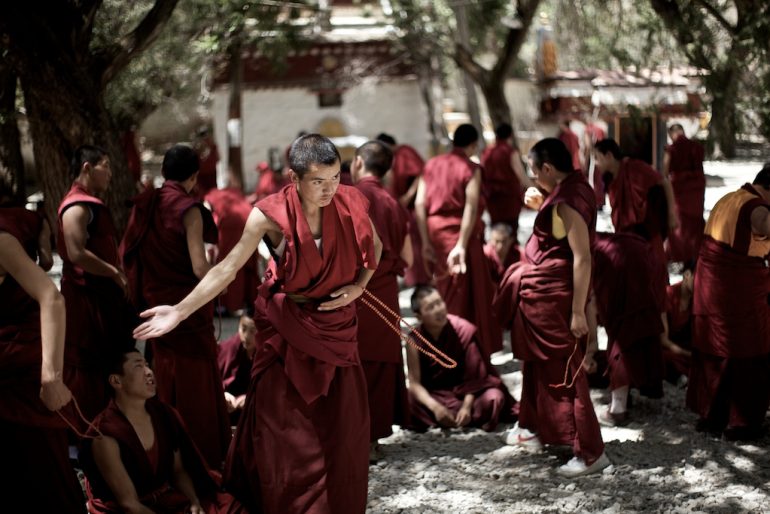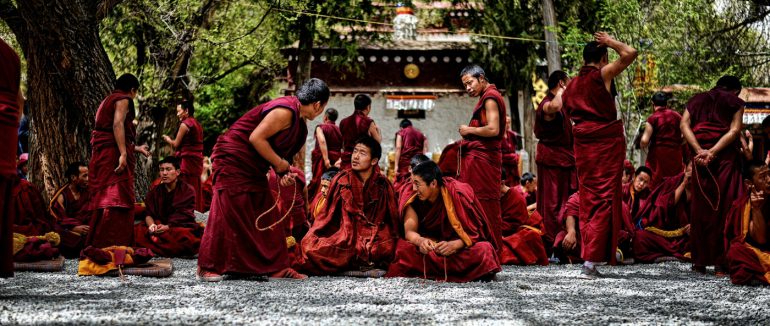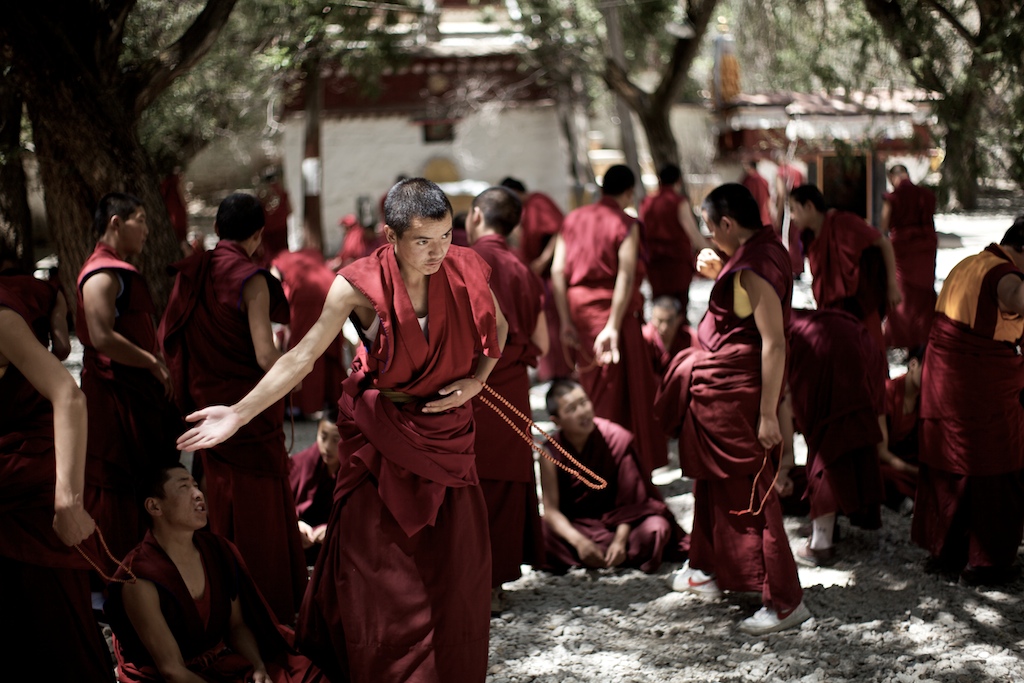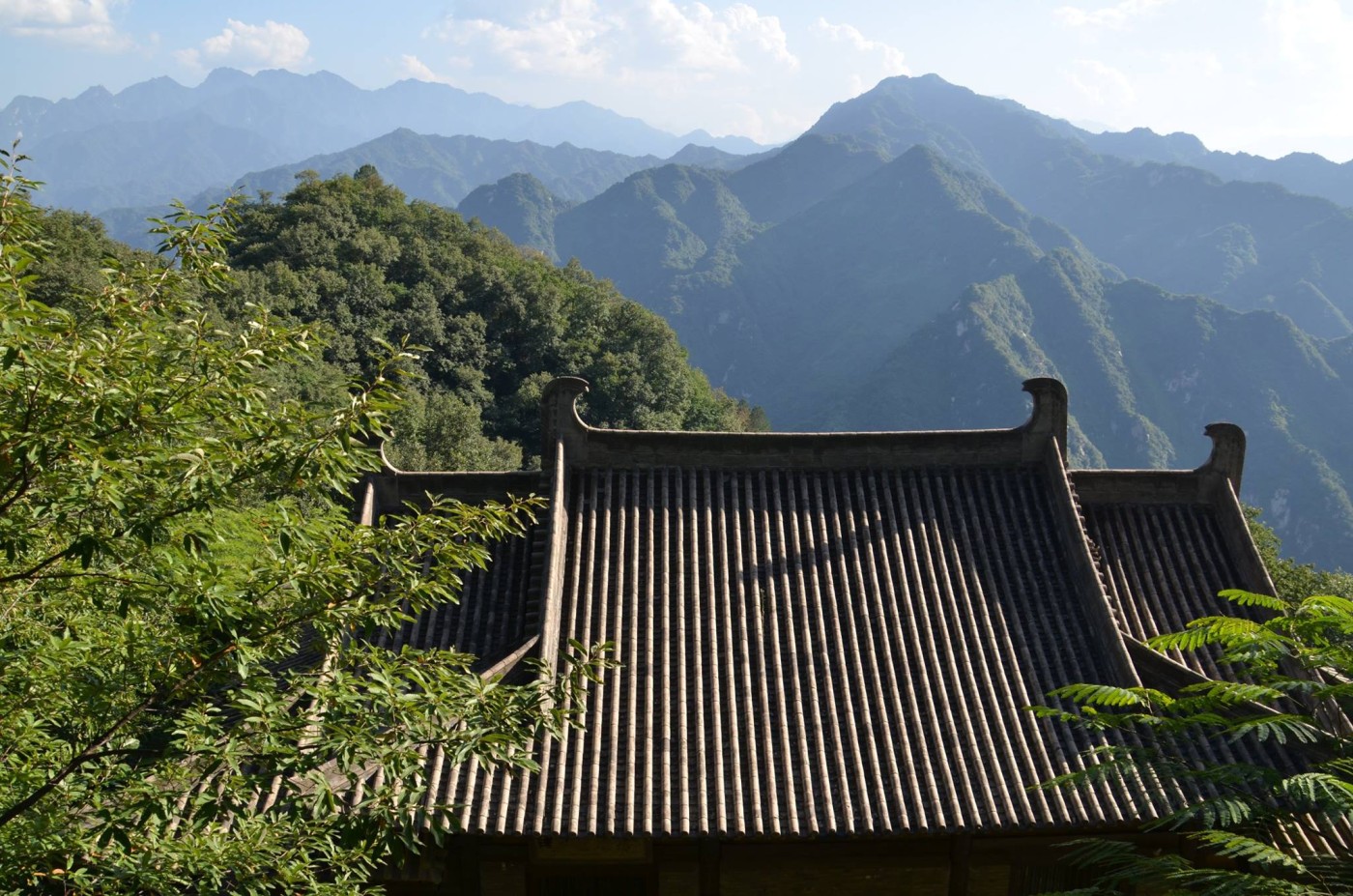The following story recounts in brief some of the events in the life of the great bodhisattva Shantideva. It is a paraphrase of sections from the Life Stories of the Lineage Teachers of the Steps of the Path (Lam-rim bla-ma brgyud-pa’i rnam-thar) written by Yongdzin Yeshe Gyeltsen (1713-1793), the teacher of the eighth Dalai Lama.
Master Shantideva was born to the west of Bodhgaya, the Seat of the Diamond, in a place called Yulkor Mosang. His father was a king named Armor of Virtue, and his mother was said to be an emanation of Vajra Yogini, the Angel of Diamond. He was able to choose the details of his birth, and when he was born he was given the name Armor of Peace. In his childhood he had all the favorable conditions that he needed, and from his earliest age he revealed himself to be a master of the traditional philosophical and other sciences.
As a child he made great efforts in this practice, doing its meditations and reciting its secret words, and was soon able to meet Gentle Voice himself
When he was six years old he met a great practitioner of the secret teachings, and received an initiation and a practice for reaching the enlightened being named Manjushri, or Gentle Voice. As a child he made great efforts in this practice, doing its meditations and reciting its secret words, and was soon able to meet Gentle Voice himself. After meeting this holy being, Master Shantideva was able to receive many teachings from him directly. When his father the King passed away, all the people of the land requested Prince Shantideva to be King.
Because he had practiced the bodhisattva path in many previous lives, he had no desire to live a life of royalty, but so as not to upset the people he agreed. The night before his crowning ceremony though he had a dream. In the dream he saw Gentle Voice sitting on the King’s throne, and He said, “Son, this is my seat and I am your Teacher. It would be improper for us to sit on the same seat.” Upon waking he realized that it was wrong for him to enjoy the pleasures of owning a kingdom, and he ran away.
It also was from this master that he received the name Shantideva, which means “Angel of Peace.”
Master Shantideva first went to Nalandra Monastery where he met the supreme leader of all the learned scholars there. His name was Angel of Virtue, and from this teacher he took the commitment to leave the home life. It also was from this master that he received the name Shantideva, which means “Angel of Peace.” At the monastery he served his preceptor well, studied the three collections of scripture, and became a great scholar. He continued to receive many teachings from Gentle Voice himself, and was able to grasp the meaning of all the Buddha’s teachings, both open and secret.
He eliminated all the different kinds of distraction,
both inner and outer, and with this incredible focus of mind he reached a very high spiritual level. He then composed the works entitled the Compendium of Trainings, the Compendium of the Sutras, and other books which describe the amazingly powerful and effective way of the life of a bodhisattva. Master Shantideva perfected within himself the three characteristics of a great Buddhist master–teaching, debating, and writing–and continued to rise up all the spiritual levels and paths. He achieved the ability to remember everything he had ever been taught, the ability to perform miracles effortlessly, and incredible clairvoyance; thus he became a god among bodhisattvas.
to the eyes of impure people Shantideva seemed to be interested in only three things: eating, sleeping, and going to the toilet
This was his inner life, but to the eyes of impure people Shantideva seemed to be interested in only three things: eating, sleeping, and going to the toilet. He thus became known by the name Bhusuku, which means “Mister Three Thoughts.” Because the only fitting activity for a man who has left the home life is to involve himself in teaching, some of the monks who could not see who he really was perceived Master Shantideva as someone who was just living off the kindness of the laypeople, and decided that they should expel him from the monastery. They asked him to recite a scripture from memory before a gathering of the monastery, hoping that their request would cause him to decide to leave on his own.
He answered them by saying, “How could someone like me ever be able to recite scripture?” and declined. However they insisted that he do so, and eventually he agreed. The entire monastery was then invited to this gathering, and a very high throne was set up, one without any stairs–so there was no way for anyone to climb atop it. But when the bodhisattva Shantideva reached the front of the throne, he touched it gently, and without the slightest effort he appeared sitting on top of it.
He then asked and said, “Would you like me to recite something you have heard before, or something which you have never heard?” The assembly asked that he recite something that they had not heard before, and so he began to recite that book which we call the Guide to the Bodhisattva’s Way of Life.
He began at the very beginning of the text, and by the time he had gotten about a third of the way through the ninth chapter he began to rise up into the sky. He rose higher and higher, and it seemed as though the sky and his knowledge were pitted in competition, until he could no longer be seen at all, only heard. Then he totally disappeared.
Later on some of the monks who had clairvoyance of the ear,
and others who were masters of total recall, pieced the whole book together. The group who were from Kashmir said that it had nine chapters, and the group from central India said it had ten. People then began to get curious about two of his other books which were mentioned in the fifth chapter of the Guide, and so they sent two monks to the place where Master Shantideva was living. They traveled to a stupa in the south of India called Pelyun Chen to invite him to come back to Nalandra. The master refused to come, but he did tell them that the people from central India were correct, and that the two books they sought could be found written in tiny letters hidden in the rafters of his old room at the monastery.
He saw in the east a great many people whose lives were disturbed by a terrible dispute and, seeing that he could help, set off in their direction
He then gave these monks a complete explanation of the both the Guide to the Bodhisattva’s Way of Life and the Compendium of Trainings. Later Master Shantideva was wondering what he could do to help others, and so he decided to check with his clairvoyance. He saw in the east a great many people whose lives were disturbed by a terrible dispute and, seeing that he could help, set off in their direction. While he was there he acted as the opponent of the great argument maker who was causing all the trouble, and with his great powers he was able to bring everyone back together. He then thought to himself, “What further could I do to benefit people?” The idea then came to him that he should travel to the kingdom of Magada in order to help the people living there who had fallen into the chasm of wrong views.
When he arrived, he found a great many people who had extremely weird wrong views, and he decided to stay with them for some time. One day, due to his extraordinary power and to the purity of the prayers these people had made in their past lives, there occurred an enormous blizzard. The storm lasted for seven days, and the community ran out of food and drink. They began to go crazy, and decided that whoever was able to come up with something to eat and drink would become their leader. The bodhisattva Shantideva was miraculously able to fill a single alms bowl with rice, and from it fed everybody in the community. As their leader he was then able to demolish their wrong views, and lead them into the Buddha’s teachings.
Master Shantideva next checked with his clairvoyance
to see who else needed help. He saw many people suffering from a famine, in desperate need of help, and thousands about to die. He provided these people with sustenance, taught them the teachings of the Buddha, and thus brought them to happiness. Then the great bodhisattva thought to himself, “What could I do to help the teachings of the Buddha?” He saw that if he were to assist a certain king it would aid many people. He journeyed to the crossroads near his palace, and began to assess the situation. He found a great crowd of mighty, but merciless people. There were a lot of them gathered already, and many others like them on their way.
During all this time Master Shantideva had no weapon other than a single wooden sword, a sword resembling the sword of Gentle Voice
These people were aware of the king’s great wealth, and this fact was causing the king much distress. He thought that if he were to use all of his wealth to pay off these people, then having obtained the kingdom would be of no point; but also that if he did not, then they would surely separate his mind from his body. Master Shantideva took a liking to the king, and arranged to be his bodyguard. Because he had limitless power and might, he was able to overpower all of the evil people, and put the king and his people at ease. During all this time Master Shantideva had no weapon other than a single wooden sword, a sword resembling the sword of Gentle Voice.
The whole kingdom began to develop great faith and respect for Master Shantideva,
and made many offerings to him. But there was one man who was very jealous of him, and could not bear all of his success. He went to the king and told him that Master Shantideva was a devious man. He told the king that Shantideva had nothing more then a wooden sword, and that he would never be able to protect him if anything happened. He said to the king, “This man is a deceiving you. Even his sword is nothing more than wood, and so he could never be able to guard your body”; and advised the king to investigate.
and when the great bodhisattva pulled out the sword, it blazed with such a light…
The king became angered, went to Master Shantideva, and told him to take his sword out of its scabbard. The bodhisattva replied saying, “Your Highness will be hurt if I do so,” but the king told him to do it anyway, whether it hurt him or not. Master Shantideva then said to him, “I agree then to take it out, but I advise Your Highness to cover one of your eyes. The king covered one eye as instructed, and when the great bodhisattva pulled out the sword, it blazed with such a light that the king’s exposed eye was blinded. The King apologized, took refuge in Master Shantideva, and entered into the teachings of the Buddha.
After this Master Shantideva thought to himself,
“What next can I do to be of help to others?” He checked with his clairvoyance, and saw there were many non-Buddhists who opposed the Teachings and needed to be subdued. He went to where they lived in the south, and dressed himself as a beggar. One day a servant of the King saw him and noticed that drops of water which touched his body instantly began to boil. There was a non-Buddhist teacher living in this land who decided that he wanted to compete with a Buddhist in miraculous powers. He made a deal with the king that whoever lost this competition would have to convert to the other’s religion, and that the winner could burn all of the monasteries and books of the loser’s religion.
The King could find no one of the Buddhist community who would agree to these conditions, and he grieved. Then the servant who had seen the miracle with Master Shantideva told him about it. The King sent out messengers to seek him, and to beg for his help in defeating the non-Buddhist teacher. The bodhisattva Shantideva told them that he would be able to help, and that they should prepare a large bowl of water, two bolts of cloth, and a fire. On the day of the competition the whole kingdom gathered, and a throne was prepared for the King.
he thought he’d try to win with his miraculous powers instead, and so he began to draw the secret world of a powerful Hindu god in the sky
The two opponents began their debates, and because of the power of Master Shantideva’s reasoning and scriptural knowledge, his opponent was unable to even respond. Because of this he thought he’d try to win with his miraculous powers instead, and so he began to draw the secret world of a powerful Hindu god in the sky. But before he had finished drawing even its eastern side, the bodhisattva Shantideva went into a deep meditation on the element of wind and brought about a great storm which began to tear apart the entire area.
The King, Queen, and the others assembled ran for cover, and the non-Buddhist teacher and his secret world were thrown about in every direction, like sparrows caught in a hurricane. A great darkness descended upon all the land, and Master Shantideva sent rays of light out from a spot between his eyes to light the way for the King and the Queen. Their clothes had been ripped off and they were covered in dust, so the great bodhisattva bathed them in the water from the bowl, dressed them in the cloth, and put them near the fire, where they could warm themselves.
Master Shantideva’s activities were exclusively dedicated to the benefit of living beings, and to helping the Buddha’s teachings. Everything he did was meant to express the truth of the saying:
“Men are like the mango fruit. Sometimes they look ripe on the outside, but are not ripe on the inside. Others are ripe on the inside, but don’t look ripe on the outside. Some look and are ripe both inside and out, and others that don’t look ripe truly are not.” For people like us who haven’t seen emptiness directly, it is very difficult to judge another’s mind.
Generally speaking then we should never allow ourselves to think that anyone at all has any bad qualities, and we should realize more specifically that criticizing anyone who has entered the Buddha’s teachings is like playing near a pit of embers concealed in ash. It is important that we not criticize other people, and to try to see all things as pure. It is to express this fact that Master Shantideva lived the way that he did. He also taught us by example many other lessons. Never be satisfied with wrong or partial paths. Train yourself in paths which are complete.
It isn’t fitting to put any faith in books which can’t bring you to total enlightenment. The only entry point for those who wish for freedom is the teachings of Enlightened Beings.
Practice what is taught in this bodhisattva’s books.
If you take Gentle Voice as your personal Angel, you will be able to achieve all wonderful qualities. It isn’t fitting to put any faith in books which can’t bring you to total enlightenment. The only entry point for those who wish for freedom is the teachings of Enlightened Beings. So if you wish to practice the teachings of the steps of the path to enlightenment, make supplication to this great bodhisattva; and learn about, contemplate, and meditate on his words.
- Some of the Events in the Life of the Great Bodhisattva Shantideva - October 2, 2015


